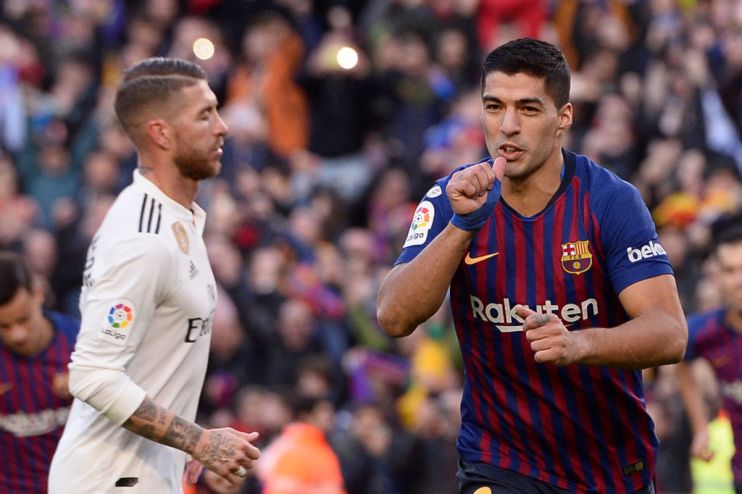Overseas matches, disruptive broadcast deals and a global network of delegates: how La Liga is trying to close the gap to the Premier League

You may have noticed Spanish football in the headlines lately – and not only because this weekend sees the latest instalment of its biggest game, El Clasico, between Barcelona and Real Madrid.
La Liga, the organisation that represents Barca, Madrid and the other 40 clubs that make up Spain’s top two divisions, and their straight-talking president Javier Tebas have been busy ruffling feathers again.
They caused a storm three months ago by announcing plans to take a league game overseas later this season, while they are also at loggerheads with key figures in the English game over the broadcasting of Spanish matches in Britain.
Such friction, however, is the by-product of La Liga’s concerted efforts to grow the profile – and, ultimately, income – of its clubs outside of Spain.
By boosting its international fanbase, La Liga believes it can continue to swell the value of its broadcast rights, which currently bring in a little more than €2bn (£1.8bn) per season, and eventually close the revenue gap to the Premier League, the global game’s richest competition by a distance, whose annual broadcast revenue remains around £1bn higher.
Staging a regular-season match abroad is the boldest manifestation of La Liga’s big push overseas.
In August it was announced that Girona’s home fixture against Barcelona in January would take place not in Catalonia but in the 65,000-capacity Hard Rock Stadium in Miami.
The pioneering move is one facet of a long-term joint venture with Relevent Sports, the American company behind the International Champions Cup series of high-profile pre-season matches.
With the United States and Canada set to co-host the 2026 World Cup with Mexico, La Liga identified North America as a key growth area and the 15-year deal with Relevent is an attempt to ensure the Spanish game is front and centre during a critical time for the sport on that side of the Atlantic.
Major repercussions
La Liga has taken a similarly disruptive approach to selling its international broadcast rights.
Facebook snapped up the rights for eight countries in the Indian subcontinent, while emerging streaming service DAZN has them in Japan, Germany, Austria and Switzerland.
Fellow over-the-top newcomers Eleven Sports fought off Sky Sports and BT Sport for the exclusive UK rights, meanwhile, in a move that could yet have major repercussions for British broadcasting.
“We’re keen to experiment with partners everywhere,” La Liga’s chief communications officer, Joris Evers – whose background at Netflix offers further clues to the league’s direction of travel – said at this month’s Leaders Sport Business Summit in London.
La Liga has also been busy on the ground. Since 2016 it has opened nine international offices in eight countries – including two in China – and established a global network of 44 delegates to give them presence in the likes of Angola, Iran, Vietnam, Costa Rica – and London.
Coaching projects have taken place in India, Jordan and Ukraine, while official live screenings of Sunday’s Clasico are due to be held in Jakarta, Miami, Shanghai and Tashkent – with some 35,000 expected to attend the event in Uzbekistan.
“We’ve got the clubs, we’ve got the players, we’ve got the fan experience and the attractive cities,” La Liga’s UK and Ireland delegate Keegan Pierce told City A.M. “Now it’s a question of bringing that experience closer to fans around the world.”
Battleground
The international drive has been led with characteristic single-mindedness by Tebas, who has put La Liga firmly on the front foot since his election as president five years ago.
One of his first and most significant acts was to centralise the sale of broadcast rights – a move which has not only seen their value more than double but also ensured more even distribution among teams.
The man who has accused Paris Saint-Germain and Manchester City of flouting financial regulations – notably accusing PSG of “peeing in the pool” – has spent his second term identifying overseas markets as the battleground in La Liga’s fight for supremacy.
Tebas’s audacious recent gambits have not been universally popular, however.
News of the Miami match met with public opposition from the Spanish Football Federation, who must yet grant its consent for the fixture to be moved, as well as the players’ union and, last week, Real Madrid.
La Liga and Eleven Sports, meanwhile, were forced to stop showing Saturday afternoon Spanish fixtures in Britain, where doing so is forbidden, under pressure from European governing body Uefa.
$10,000 bet
Both issues remain unresolved, although Tebas and La Liga have given every indication that they will not back down.
Of the Miami game, Pierce says: “We think it’s going to be a real opportunity for fans to get closer to La Liga and its clubs in North America. We continue to push to make this match a reality.”
Tebas, speaking October, said he would “bet $10,000 that the game will take place”.
Eleven have indicated that they may challenge British broadcasting restrictions in the European courts – a move that would, it is understood, be supported in principle by La Liga and could, ultimately, lead to much more football, domestic and otherwise, being shown in the UK.
History suggests it would be unwise to bet against Tebas on any of these matters.
When his vision for centralising the sale of La Liga’s broadcast rights met with opposition, he forced it through by obtaining a royal decree from the Spanish government.
“People who know me know that I don’t take a ‘no’ for an answer,” he told CNN earlier this year. The Premier League, the Football Association, Uefa, Spanish Football Federation, Real Madrid: take note.
